Alumni Unite to Create Class Scholarships for Future Physicians
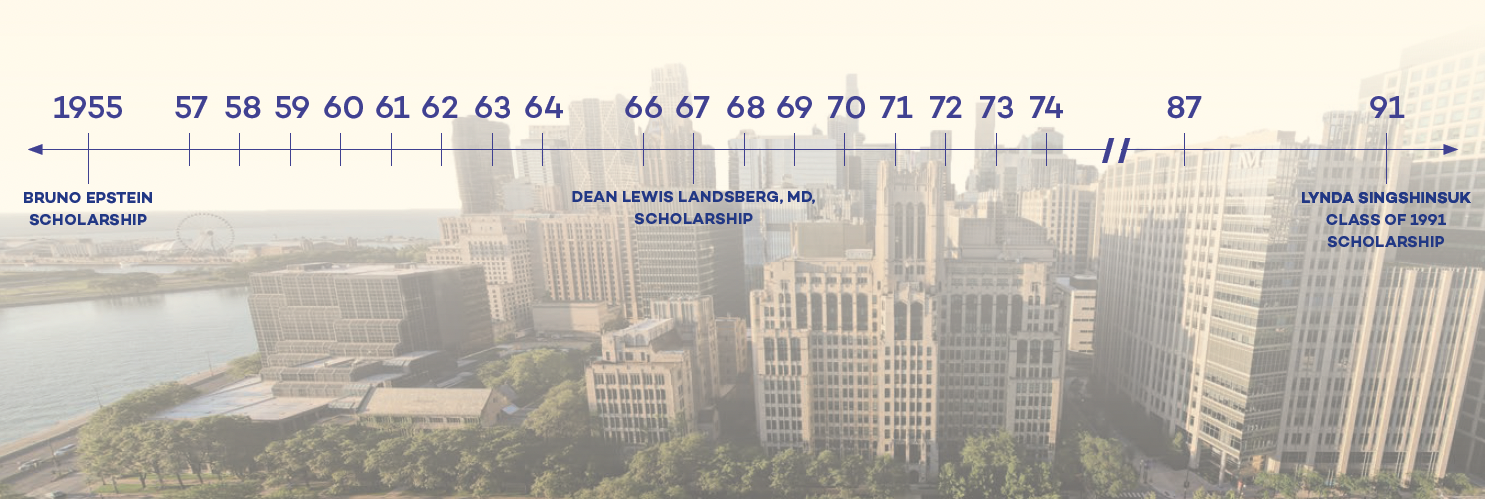
A big thank you to all of the alumni and friends who have given to class scholarships to date, including the classes noted above.
This story was published in the March 2022 issue of The Philanthropist, a newsletter for supporters and friends of Northwestern University Feinberg School of Medicine. Read the whole issue here.
Working together, hundreds of Northwestern’s medical school alumni have generously contributed to class scholarships to support the physicians who will follow in their footsteps.
“Our alumni know better than anyone the challenges and rewards of a superb medical education. It is humbling to see them enthusiastically give back to scholarships so that exceptional aspiring physicians get the same opportunities to serve patients and advance the field of medicine,” said Alan M. Krensky, MD, executive for Development at Northwestern Medicine and vice dean for Development and Alumni Relations at Feinberg.
Fundraising for scholarships remains a priority for Feinberg. Scholarships are a competitive necessity today, helping the medical school attract the very best applicants. They also ensure that students of all backgrounds have a chance to pursue careers in medicine, in any specialty they choose, without the burden of extreme debt (read one of our student’s stories on page 9).
Currently, 67 percent of Feinberg students receive some financial aid, while the average debt for members of the Class of 2021 was over $200,000. This is progress, thanks to the remarkable generosity of many donors, but the medical school still has a long way to go to provide financial aid to all of its students.
Thank you to all of the alumni and friends who are helping Feinberg students pursue their passions for medicine. To date, gifts of all sizes have collectively endowed 19 class scholarships, which require an initial investment of $100,000 (a percentage of the interest earned on the endowment is awarded to students each year). These funds—and the legacies of our alumni—will live on in perpetuity, helping future physicians and physician-scientists for generations to come.
Class of 1964: Building a Family Legacy
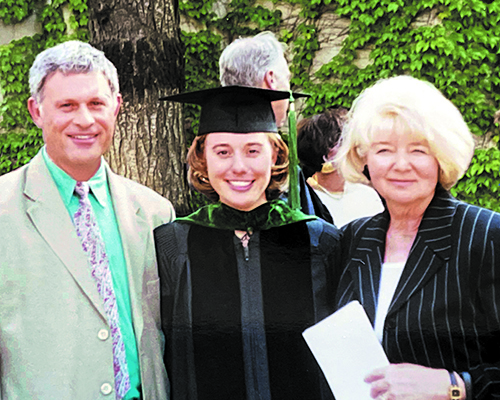
Michael Herrell, ’64 MD, has supported his alma mater since he was a young physician just starting a career as a pathologist in his hometown of Evansville, Indiana. He began with $100 gifts every year to the annual fund, a resource for the medical school’s areas of greatest need at any given point in time.
In 2013, when his peers—spearheaded by Howard Schuele, ’64 MD, ’71 GME; Tim Sullivan, ’64 MD, Howard Kidd, ’64 MD, and the late Richard “Dick” Dedo, ’64 MD, ’69 GME—set up the Class of 1964 Scholarship, Dr. Herrell enthusiastically contributed to that, too.
“My experience at Northwestern University Medical School had a really huge influence on my life,” Dr. Herrell said. “The faculty opened doors for me. They encouraged my interest in pathology and arranged the elective rotation that ended up establishing it as my choice of a career.”
Northwestern also played a major role in Dr. Herrell’s personal life: During a rotation at Passavant Hospital, he met his future wife, Helen, an administrator in medical records at the time. Dr. Herrell requested a chart and a date, and the rest is history.
“Helen and I have a lot of fond memories of Chicago,” Dr. Herrell shared. Decades later, their youngest daughter, Jennifer Herrell, ’99 MD, attended Northwestern for medical school, too, and joined the same medical fraternity as her dad.
After visiting campus for Dr. Herrell’s 50th reunion, the couple realized they could do more to help students. They decided to create the Herrell Family Scholarship through a charitable gift annuity, in addition to donating to the class scholarship.
“It’s not cheap to go to any kind of graduate school these days,” Dr. Herrell said. “Most students have to work many years to pay off their borrowing. It would be nice if we had scholarships for every incoming medical student.”
Through their scholarship support, the Herrells will empower new physicians who will pave the future of medicine, much like Dr. Herrell and his classmates did over the last five decades.
“When I went to medical school, we had a one-day lecture about cytogenetics,” he remembered, referencing a branch of genetics involving the analysis of chromosomes in individual cells. It plays an important role in diagnosing and treating diseases today.
“I set up a cytogenetics lab in the army in Germany during Vietnam after learning the procedures at the University of Michigan during my residency. Then I did it again when I moved back to my hometown’s hospital. I had a fulfilling career in medicine and am now happy to help others contribute to the field in their own ways.”
Class of 1972: Paying Generosity Forward
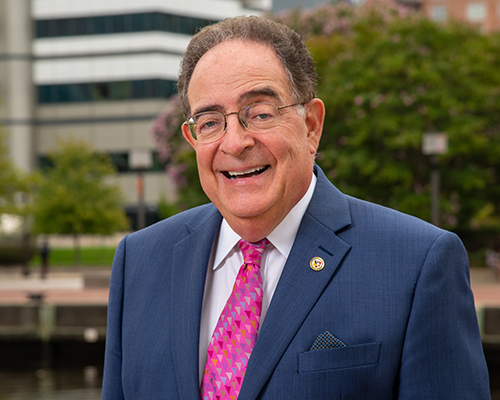
Jay Perman, ’72 MD, chancellor of the University System of Maryland and a pediatric gastroenterologist, is a longtime donor to Feinberg’s medical school scholarship fund. Here, Dr. Perman reflects on how his Northwestern education prepared him for a successful career and explains why he wants to work with his former classmates to establish a Class of 1972 scholarship.
“The road from physician to chancellor of a major university system isn’t one that’s traveled often. But here is something else that’s unusual: I still practice medicine. Each week, I treat young children and work with their families in my clinic at the University of Maryland Medical Center. I also teach team-based healthcare to students in six professional schools at the University of Maryland, Baltimore.
It’s certainly a pull on my time, but I do it because I love it. I think it’s vitally important that health professionals learn how to work and communicate with one another in a team setting. It also helps me understand what is on students’ minds and what we need to do better—as educators, universities, and organizations rooted in communities that need our engagement and service.
I also do it because I feel that I’m well-equipped to continue running the clinic and teaching students. I credit that to the medical education I received at Feinberg. So many years later, I still have confidence to stand in front of today’s medical students and residents and be part of their training because of the strong foundation I got from Northwestern and the scholarship that made it possible.
Growing up, I was the only child of immigrant parents who fled persecution in Ukraine to settle in Chicago. They opened a hand laundry on the city’s West Side. I was 14 years old when my father passed away from esophageal cancer. My mother took a second job as a seamstress to make ends meet.
From a very young age, I knew I wanted to be a physician. I was fortunate to be accepted to Northwestern for my undergraduate education—and to get scholarships and work-study and a modest student loan to be able to pay the tuition.
I was accepted to the school of medicine, but that didn’t seem to matter much, because I knew there was no way I’d ever be able to afford it. Then I got a letter in the mail from Northwestern telling me I was the Ploner Scholar and that my medical education would be paid for.
I went to medical school for nothing—not a penny out of my pocket or my mother’s pocket. I graduated with no student debt. That’s what I want to do for someone else. Someone made my entire career possible for me, and now I’ve got to do the same thing for someone who’s coming behind me. I think there are classmates of mine who have a similar story to tell, and if they do, I think they’ll want to do the very same thing.
I never got to meet Mrs. Louise Ploner, my benefactor, but I did just recently connect with her grand-nephew. I thanked him for his family’s long-ago kindness. I told him what that gift had made possible for me. It was so gratifying to be able to show my appreciation. But I believe it will be even more gratifying to pay the family’s generosity forward. That’s what I plan to do.”
Class of 1991: Remembering a Beloved Classmate
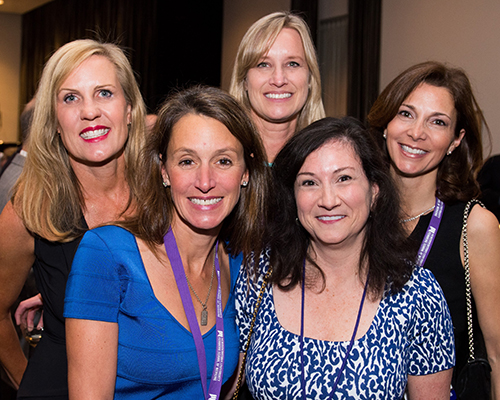
During their third year of medical school, members of the Class of 1991 experienced the unthinkable: the murder of their classmate, Lynda Singshinsuk. Years later, they have not forgotten her. To honor Lynda and the lost promise of all that she would have given to medicine, her peers established the Lynda Singshinsuk Class of 1991 Scholarship.
“Lynda was so smart. She was the teacher’s assistant in our histology class, enrolled in the course while simultaneously teaching the rest of us,” remembered Farah Hashemi Fakouri, ’91 MD, ’92 GME, a specialist in vascular medicine and infectious disease in Chicago. She came up with the idea to name the scholarship after Lynda.
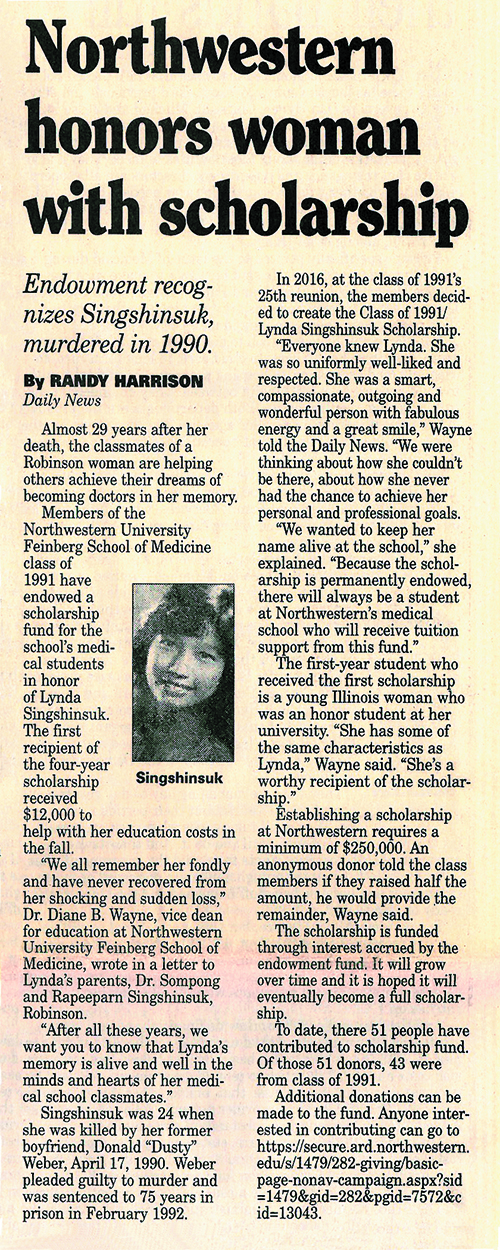
“This scholarship reminds us of her," added Dr. Fakouri. "It reminds us that we survived what Lynda did not. It reminds us that it is our honor and privilege to be able to be physicians. Lynda would have made such a fine one.”
“Lynda always wanted to become a doctor so she could help people,” said Rapeepam Singshinsuk, Lynda’s mother. She and her husband, Sompong Singshinsuk, MD, have planned an estate gift to support the scholarship. “We want to help future students so that they can go on to help people like Lynda would have. We want her name to carry on.”
Greg Kastner, MD, who lives in Lynda’s hometown—Robinson, Illinois—also contributes to the scholarship fund. Lynda used to shadow him at his medical practice. “In addition to being very bright, with a promising career ahead of her, Lynda was the embodiment of kindness and compassion,” he shared.
Working together, 34 alumni and friends have made the Lynda Singshinsuk Scholarship one of the most successful endowed scholarships at the medical school. So far they have pledged more than $250,000 in outright gifts and $1.5 million in planned gifts to fund medical students who go on to serve patients in Lynda’s name in perpetuity.
“We hope these dollars raised help pave the way for yet another promising young mind, like our talented classmate,” Dr. Fakouri added. “May God bless Lynda, her memory, her family, and the generosity of the doctors from the Class of 1991. This scholarship is the least we can do to pay tribute.”
For more information about supporting scholarships through outright or estate gifts, please contact Larry Kuhn at 312-503-1717 or larry-kuhn@northwestern.edu.